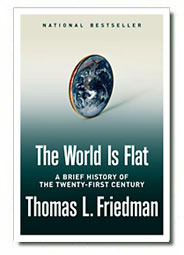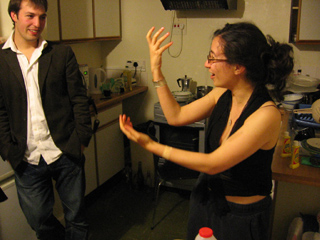 In The World is Flat, Thomas Friedman provides a reasonable introduction to some aspects of globalization for the general audience. The strength of the book lies much more in the examples than in the analysis, which can sometimes be glib and patronizing. Even so, I would personally have appreciated fewer wonder stories about the internet transforming business and more discussion of the kind that concludes the book: on the complexities and caveats of the globalization process.
In The World is Flat, Thomas Friedman provides a reasonable introduction to some aspects of globalization for the general audience. The strength of the book lies much more in the examples than in the analysis, which can sometimes be glib and patronizing. Even so, I would personally have appreciated fewer wonder stories about the internet transforming business and more discussion of the kind that concludes the book: on the complexities and caveats of the globalization process.
Friedman’s argument that the ‘world is flat’ strikes me as little more than a different way of saying that it is ‘smaller.’ Further perpetuation of the outrageously false notion that the world was thought flat pre-Columbus is never welcome. Sorry, Mr. Friedman, but Eratosthenes of Cyrene identified the size and shape of the Earth correctly back in the 2nd century BCE. That trifling correction aside, it can be little disputed that Friedman uses his analogy far, far too often.
At its best, the book is a fairly robust defence of the practice of outsourcing. Friedman argues effectively that the benefits are nearly universal, while still pointing out the importance of having societal systems to assist those who are harmed by the changes. Insofar as the book demonstrates the extent to which change and competition look set to become ever-more constant features of the lives of all people, I find it worrisome. India and China might not be quite as ready to take over as he seems to indicate, but the extent of competition in an increasingly globalized world has undeniably expanded. Like most people, I worry about whether I am going to be able to manage.
Friedman’s analysis of global terrorism includes some insightful discussion: especially with regards to the importance of humiliation as a motivating phenomenon. Understanding the psychology of terrorism – and why well-educated Saudis have become suicide bombers, but virtually no Indian Muslims or any type – is clearly essential for dealing with the problem.
In summary, while the book is overly long and sometimes lacking in analytical quality, it is worthwhile to have a look through, especially if you’re looking for examples of how business practices are changing as the result of increased global communications, competition, and supply chains. I don’t think The Economist was entirely justified in calling the book “a dreary failure,” but it certainly isn’t a stunning success.
Changing gears, I am going to read Alain de Botton’s Essays in Love next. It has been on my discretionary reading list for so long now that I can’t remember who was the other party to my promise that I would read it.

 In
In 


 Caffeine – a molecule I first discovered as an important and psychoactive component of Coca Cola – is a drug with which I’ve had a great deal of experience over the last twelve years or so. By 7th grade, the last year of elementary school, I had already started to enjoy mochas and chocolate covered coffee beans. When I was in 12th grade, the last year of high school, I began consuming large amounts of Earl Gray tea, in aid of paper writing and exam prep. During my first year at UBC, I started drinking coffee. At first, it was a matter of alternating between coffee itself and something sweet and delicious, like Ponderosa Cake. By my fourth year, I was drinking more than 1L a day of black coffee: passing from French press to mug to bloodstream in accompaniment to the reading of The Economist.
Caffeine – a molecule I first discovered as an important and psychoactive component of Coca Cola – is a drug with which I’ve had a great deal of experience over the last twelve years or so. By 7th grade, the last year of elementary school, I had already started to enjoy mochas and chocolate covered coffee beans. When I was in 12th grade, the last year of high school, I began consuming large amounts of Earl Gray tea, in aid of paper writing and exam prep. During my first year at UBC, I started drinking coffee. At first, it was a matter of alternating between coffee itself and something sweet and delicious, like Ponderosa Cake. By my fourth year, I was drinking more than 1L a day of black coffee: passing from French press to mug to bloodstream in accompaniment to the reading of The Economist.